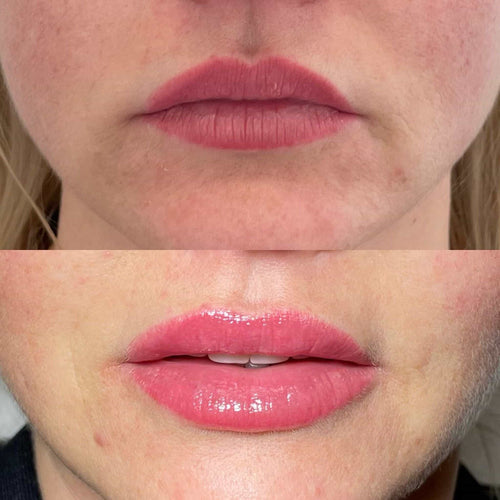Schedule a Dermal Filler Appointment with Dr. Laura Geige at It’s Me and You Clinic
Possible Causes
Bone Structure
There are several potential causes for sunken temples, a condition medically known as *temporal hollowing*. These range from natural aging to underlying health issues.

Bone Structure plays a significant role in determining how prominent or recessed your temples appear.
- Genetics: Some individuals naturally have thinner bones in the temporal region, leading to more noticeable temple hollows even at a young age.
- Age-related Changes: As we age, facial tissues, including fat pads, naturally atrophy. This can cause the temples to appear sunken as there’s less cushioning beneath the skin.
Beyond bone structure, several other factors contribute to the appearance of sunken temples:

- Weight Loss: Significant weight loss, especially rapid weight loss, can result in fat depletion throughout the body, including the face. This can accentuate the hollowness of the temples.
- Dehydration: When dehydrated, the body loses fluids, causing facial tissues to appear thinner and more sunken, including the temples.
- Certain Medical Conditions:
- Malnutrition:**
- Hormonal Imbalances: Conditions like hyperthyroidism can cause accelerated metabolism and weight loss, potentially leading to sunken temples.
Long-term nutritional deficiencies can lead to muscle wasting and fat loss, contributing to a gaunt appearance with prominent temple hollows.
It’s important to consult a healthcare professional if you are concerned about the appearance of your temples. They can help determine the underlying cause and recommend appropriate treatment options if necessary.
Weight Loss or Muscle Atrophy
Sunken temples are a visible sign of significant weight loss and can also be associated with muscle atrophy.
Here are some possible causes for these conditions:
- Malnutrition: A severe lack of essential nutrients, either due to insufficient food intake or poor absorption, can lead to weight loss and muscle breakdown.
- Eating Disorders: Conditions like anorexia nervosa and bulimia involve extreme dieting and unhealthy eating habits, resulting in significant weight loss and potential muscle atrophy.
- Chronic Illnesses: Certain illnesses, such as cancer, HIV/AIDS, tuberculosis, and hyperthyroidism, can cause muscle wasting and weight loss as a result of metabolic changes or the body’s fight against disease.
- Medication Side Effects: Some medications, including corticosteroids, chemotherapy drugs, and antidepressants, can have weight loss and muscle atrophy as side effects.
- Dehydration:** Significant fluid loss due to excessive sweating, vomiting, diarrhea, or inadequate water intake can cause facial skin to appear sunken.
- Aging: As we age, natural muscle mass decreases, which can contribute to a more hollow appearance in the face and temples.
Arrange a Dermal Filler Consultation with Dr. Laura Geige Now
If you are concerned about sunken temples or unexplained weight loss or muscle atrophy, it’s essential to consult a healthcare professional for a proper diagnosis and treatment plan.
Facial Aging
Sunken temples are a common concern as we age, often attributed to **facial aging**. Several factors contribute to this change in facial structure.
One primary cause is the loss of volume in the face. As we get older, our bodies naturally produce less collagen and elastin, which are proteins that provide skin with its firmness and elasticity. This loss of volume leads to a flattening of the midface, including the temples.
Another factor is bone resorption, the gradual breakdown of bone tissue. Over time, the cheekbones and other facial bones can lose density, resulting in a more sunken appearance. This process is accelerated by hormonal changes associated with aging, particularly the decline in estrogen levels in women.
Genetics also play a role in facial aging and the tendency for temples to become sunken. Some individuals are genetically predisposed to thinner skin and less bone density, making them more susceptible to these changes.
Lifestyle factors can further contribute to sunken temples. Sun exposure**, excessive smoking, and poor nutrition can all damage collagen and elastin fibers, accelerating the aging process.
In addition to these intrinsic factors, certain medical conditions can also cause sunken temples. For example, thyroid disorders, malnutrition, and dehydration can lead to significant fluid loss, resulting in a more hollow appearance around the eyes and temples.
Underlying Medical Conditions
Osteoporosis
Osteoporosis, often referred to as “brittle bones,” is a condition characterized by low bone density and deterioration of bone tissue. This weakening of the bones increases the risk of fractures, even from minor injuries.
Underlying medical conditions can play a significant role in the development and progression of osteoporosis. Some common underlying conditions include:
- Hormonal Imbalances: Conditions affecting hormone levels, particularly estrogen deficiency (as seen in menopause) or low testosterone (in men), are major risk factors. Estrogen is crucial for bone health, so its decline contributes to bone loss.
- Autoimmune Diseases: Certain autoimmune diseases like rheumatoid arthritis and lupus can attack the bones, leading to inflammation and weakening of bone tissue.
- Endocrine Disorders: Conditions affecting the thyroid gland (hyperthyroidism or hypothyroidism) can disrupt calcium metabolism and influence bone health.
- Malabsorption Syndromes: Diseases that interfere with nutrient absorption, such as celiac disease, can hinder the body’s ability to absorb essential minerals like calcium and vitamin D, both vital for bone strength.
- Kidney Disease: Kidneys play a role in activating vitamin D, which is necessary for calcium absorption. Kidney disease can impair this process, leading to weaker bones.
Book Your Dermal Filler Appointment with Dr. Laura Geige at It’s Me and You Clinic
While these conditions are known to contribute to osteoporosis, it’s important to note that not everyone with these underlying medical conditions will develop osteoporosis.
Other factors like genetics, lifestyle choices (diet, exercise), and smoking habits also influence bone health.
Thyroid Disorders
Sunken temples, also known as temporal hollowing, can be a concerning symptom with various potential causes. While often associated with weight loss or aging, underlying medical conditions can also contribute to this appearance.
Thyroid disorders are one such group of conditions that can cause sunken temples. The thyroid gland, located in the neck, produces hormones that regulate metabolism, energy levels, and many other bodily functions. When the thyroid is not functioning properly, it can lead to changes in the body’s overall appearance.
Hypothyroidism, an underactive thyroid, occurs when the thyroid gland doesn’t produce enough thyroid hormone. This can result in a slowdown of metabolism, leading to weight gain, fatigue, and fluid retention. In some cases, hypothyroidism can also cause facial changes, including sunken temples, due to fluid loss and tissue breakdown.
Hyperthyroidism, an overactive thyroid, is the opposite condition, where the thyroid produces too much hormone. This can speed up metabolism, leading to weight loss, rapid heartbeat, and anxiety. Hyperthyroidism can also affect the face, but instead of causing sunken temples, it may lead to puffiness or a swollen appearance.
It’s important to note that other medical conditions can also cause sunken temples, such as malnutrition, dehydration, hormonal imbalances, and certain genetic disorders. Therefore, if you are concerned about sunken temples, it is essential to consult a healthcare professional for proper diagnosis and treatment.
A doctor will conduct a physical examination, review your medical history, and may order blood tests to check thyroid hormone levels or rule out other potential causes. Based on the diagnosis, the appropriate treatment plan can be developed, which may involve medication, lifestyle changes, or in some cases, surgery.
Eating Disorders
Sunken temples can be caused by a variety of factors, some of which may be related to underlying medical conditions or eating disorders.
Here are some possibilities:
* **Dehydration:** A common cause of sunken temples is dehydration. When you don’t drink enough fluids, your body loses water weight, and the tissues around your face, including those in your temples, can appear hollowed out.
Underlying Medical Conditions:
Several medical conditions can contribute to sunken temples:
1. **Malnutrition:** Prolonged malnutrition, whether due to an eating disorder or other underlying health issues, can lead to muscle loss and fat depletion, causing the face to appear gaunt with prominent cheekbones and sunken temples.
2.
Thyroid Disorders: Both hypothyroidism (underactive thyroid) and hyperthyroidism (overactive thyroid) can cause changes in facial appearance, including sunken temples. This is due to the impact of thyroid hormone on metabolism and tissue health.
3. **Hormonal Imbalances:** Conditions like Cushing’s syndrome, which involves an excess of cortisol, can lead to a round face but also hollowing in other areas, including the temples.
4.
Aging: As we age, our skin loses elasticity and collagen. This natural process can result in thinner skin and more prominent bone structure, leading to sunken temples.
**Eating Disorders:**
Individuals with eating disorders may experience sunken temples as a result of:
1.
Severe Calorie Restriction:
Restricting calories severely deprives the body of essential nutrients and energy, leading to muscle loss, bone weakening, and facial wasting.
2.
Purging Behaviors:
Frequent vomiting or misuse of laxatives can lead to dehydration, electrolyte imbalance, and malnutrition, all contributing to a sunken appearance in the temples.
It’s essential to consult with a medical professional if you are concerned about sunken temples. They can evaluate your overall health, consider any potential underlying conditions, and recommend appropriate treatment options if necessary.
Lifestyle Factors
Dehydration
Lifestyle factors play a significant role in overall health, including how our body retains fluids and maintains its structure. Dehydration, a common condition caused by insufficient fluid intake, can lead to various physical changes, including sunken temples.
Insufficient water consumption directly impacts the volume of fluids within your body tissues, including those surrounding the eyes and skull bones. When dehydrated, these tissues lose volume, causing them to appear less prominent. This can manifest as sunken temples, a hollow appearance beneath the eyes, and even a general sense of facial “sagging.”
Alongside direct water intake, certain lifestyle choices can exacerbate dehydration. Excessive alcohol consumption is a notorious culprit, acting as a diuretic that increases urine production and fluid loss.
Similarly, high caffeine intake can contribute to dehydration through a similar mechanism. Consuming large amounts of caffeinated beverages can stimulate urine production, potentially outweighing any hydration benefits from the beverage itself.
Chronic stress also impacts the body’s fluid balance. Stress hormones can trigger increased cortisol levels, which promote water loss and dehydration.
Poor dietary habits, particularly a lack of fruits and vegetables rich in electrolytes (minerals like sodium, potassium, and magnesium), can further contribute to dehydration by disrupting the body’s electrolyte balance and its ability to retain fluids effectively.
Addressing sunken temples often involves improving overall hydration. This means consuming adequate water throughout the day, limiting alcohol and caffeine intake, managing stress levels, and adopting a balanced diet rich in fruits, vegetables, and electrolytes.
Sun Exposure and Damage
Lifestyle factors play a significant role in the health and appearance of our skin, including the temples. While sun exposure is a major culprit in collagen breakdown and premature aging, other lifestyle choices can either exacerbate or mitigate its effects.
Smoking, for example, significantly damages collagen and elastin fibers, leading to wrinkles and sagging skin, which can make temples appear sunken. Excessive alcohol consumption can dehydrate the skin, further contributing to a loss of volume and definition in the face.
Poor nutrition, lacking essential vitamins and minerals like vitamin C, zinc, and copper, hinders collagen production and repair, weakening the skin’s structure. Conversely, a balanced diet rich in antioxidants, fruits, vegetables, and healthy fats can protect the skin from damage and support collagen synthesis.
Sun exposure is the primary cause of premature aging, including sunken temples. Ultraviolet (UV) rays penetrate the skin, damaging collagen and elastin fibers responsible for skin elasticity and firmness. Over time, this damage leads to a loss of volume and definition in the face, making temples appear more pronounced or sunken.
The intensity and duration of sun exposure directly correlate with the degree of damage. Prolonged exposure without protection, particularly during peak UV hours, significantly accelerates collagen breakdown. Even on cloudy days, UV rays can penetrate clouds, so year-round sun protection is crucial.
It’s important to note that genetics also plays a role in facial aging and bone structure. Some individuals may be genetically predisposed to thinner skin or a less prominent cheekbone structure, making temples appear more sunken regardless of lifestyle factors or sun exposure.
Highland Spring Magazine Back to Work Experts N City Magazine En Bloch Hotels Azmia Magane
- Why Are THC Beverages So Popular Among Millennials? - November 10, 2025
- What Is The Aftercare For A Liquid Facelift? - November 9, 2025
- What Age Can U Get Lip Filler - November 8, 2025
